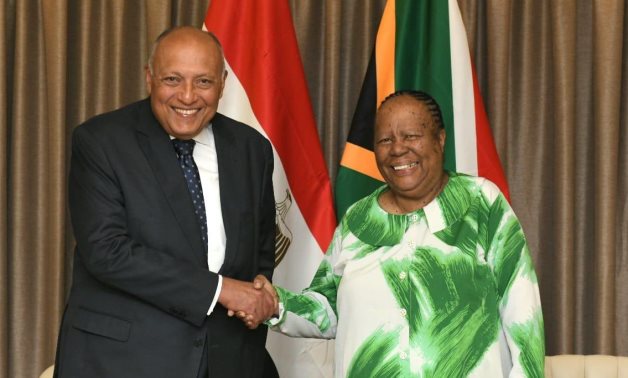
Egyptian Foreign Minister Sameh Shoukry held political consultations with his South African counterpart Naledi Pandor in Pretoria on April 19, 2024- press photo
CAIRO – April 19, 2024: Egyptian Foreign Minister Sameh Shoukry held political consultations with his South African counterpart Naledi Pandor in Pretoria as part of the joint committee's proceedings between Egypt and South Africa.
According to a statement released by the Egyptian Foreign Ministry on Friday, they engaged in discussions encompassing bilateral relations and developments in regional and international affairs pertinent to both nations.
The ministers commended the recent momentum observed in political and economic relations between their countries, as well as the existing level of consultation and coordination on various regional and international issues of mutual concern.
Emphasizing the significance of bolstering coordination, particularly within the African Union framework, they highlighted priorities such as institutional reform, expenditure rationalization, reinforcement of monitoring mechanisms, and the election of the Commission's leadership for the year 2025.
Minister Shoukry underscored Egypt's commitment to its membership in the African Peace and Security Council, initiated in April 2025, stressing the agenda's focus on enhancing peace and security across the continent.
Expressing Egypt's stance, Shoukry reiterated full opposition to any military actions in Palestinian Rafah due to their severe humanitarian implications. He emphasized the urgent need for an immediate and lasting ceasefire in the Gaza Strip and the unimpeded access of humanitarian aid.
Shoukry also voiced disappointment at the Security Council's failure to pass a resolution granting full United Nations membership to the State of Palestine the previous day.
Furthermore, Shoukry commended South Africa's steadfast support for the Palestinian cause and the two-state solution as the foundation for a final settlement. He lauded the efforts toward a just and lasting resolution of the issue and stressed the importance of heightened communication with relevant international and regional stakeholders to de-escalate tensions and mitigate the current crisis, cautioning against its potential escalation.
The consultations also addressed developments in the Sudanese crisis. Both ministers expressed their determination to enhance collaborative efforts towards finding effective solutions to the crisis, aiming to halt the armed conflict and prevent further loss of life.
Shoukry and Pandor emphasized the imperative of fully respecting Sudan's sovereignty, unity, and territorial integrity, as well as the significance of safeguarding Sudanese statehood and its institutions.
Furthermore, Minister Shoukry briefed on Egyptian endeavors to address the humanitarian fallout of the crisis, underlining the necessity for the international community and donor parties to approach the matter with seriousness and comprehensiveness. He emphasized the importance of fulfilling pledges made at the donor conference in June 2023 and at the Paris international meeting to support Sudan and neighboring countries, held on April 15, 2024.
The Egyptian Minister underscored Egypt’s ambition to play an active and influential role within the BRICS group, emphasizing the importance of close cooperation with South Africa to contribute to the group's endeavors in finding practical and implementable solutions to address the challenges faced by member countries. This entails intensifying collaborative efforts within the framework of South-South cooperation and coordinating to enhance the group's capacity to articulate the perspectives of Southern countries, thereby advocating for global economic governance institutions to better address the aspirations and challenges of developing nations.
Furthermore, the ministers affirmed the significance of working together to represent the priorities of developing countries, particularly those in Africa, within the G20. They emphasized the urgent need for the G20 to effectively address the debt crisis, which has impacted more than 37 countries, including 21 African nations.
Also, the two sides discussed various regional and international issues and files of common interest, most notably enhancing stability in the Horn of Africa region, the situation in Libya, and the repercussions of the Russian-Ukrainian war on the region and the two countries.
They also addressed other issues like the increasing risks of the ongoing tensions in the Red Sea and their serious consequences on the security and safety of international navigation.
They also tackled causes of terrorism and unconstitutional changes in the Sahel region and West Africa, besides the file of reform and expansion of the Security Council, and commitment to the unified African position.
The ministers emphasized the importance of preserving the current coordination between Egypt and South Africa concerning these issues and challenges. This collaboration is particularly crucial given the world's critical state and the significant challenges that demand solidarity between the two nations. This solidarity is essential to address these challenges, safeguard the interests of both peoples, and ensure the security of countries and populations across the continent.
Comments
Leave a Comment